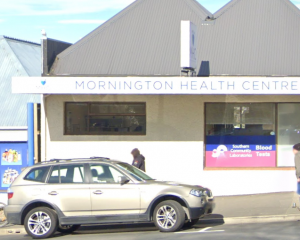Alex Hedley said if the pay deal offered by Health New Zealand Te Whatu Ora (HNZ) was accepted, he would be paid $1000 less each month working in public health.
He and other Dunedin members of the New Zealand Resident Doctors Association (NZRDA) took to the streets yesterday morning to protest the offer amid a nationwide 25-hour strike.
The group gathered at the corner of Great King and Hanover Sts, chanting slogans and waving signs such as "every resident doctor counts" and "saving money, wasting lives".
Protesters’ pooches also spread the message junior doctors were "working like a dog".

He was finishing his master’s degree at present and would restart work for HNZ later in the year.
While looking forward to this, he was gutted at the current prospect of a $1000-per-month pay drop and wanted HNZ to provide a better deal.
"It’s a major cut for people in my position and others as well.
"We need to ensure that the New Zealand public health service remains in good shape, and to do that is to make sure we are retaining our doctors and training them effectively."

They would rather be in the hospital working, but it was important to make the government and the public aware of the issues they faced, Dr Lu said.
"The main concern we have is that the proposal ... included giving a pay cut up to 12% for some of the most vulnerable professions."
This included not only public health but also areas such as radiation oncology, general practice and psychiatry.
In the midst of a crisis in primary care and mental healthcare, he simply could not understand the offer.

Further strikes were possible, although hopefully avoidable, Dr Lu said.
Resident medical officer Sam Anderson said there were about 500 vacancies throughout the country, illustrating the lack of workforce planning by the health system.
"There are more doctors who are now cross-covering and covering for structural vacancies," he said.
He noted the absence of radiation oncology trainees at the protest — they were no longer trained in Dunedin due to the shortage of senior staff.

HNZ chief people officer Andrew Slater said junior doctors were a valued part of the workforce, and HNZ had already indicated it was prepared to make a very significant investment in settling the NZRDA collective agreement.
"We are pleased our application for facilitation has been granted and await the response of the union to the recommendation from the Employment Relations Authority.
"We look forward to facilitation as a potential pathway to resolving the bargaining."
The strike is set to end at 8am today.












